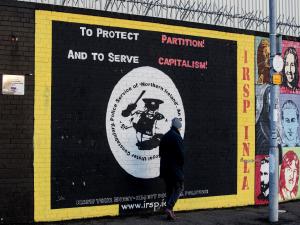
By Michael McHugh, Press Association
Relationships between police and the community in west Belfast have deteriorated and distrust grown, a report said.
Frustration with the "slow" pace of the criminal justice system produced low levels of reporting of crime and cooperation, researchers said.
Some viewed so-called punishment attacks as a form of immediate respite or redress, the report drawn up for Cooperation Ireland showed.
It said: "There is a general sense of distrust in the PSNI and the criminal justice system and frustration with the slow pace of the criminal justice system has led to low levels of reporting and cooperation by the local community.
"Relationships between the community and the PSNI are seen as deteriorating in recent years."
One of the reasons for the cooling of relations is the perceived sporadic nature of police involvement in communities, the review added.
The withdrawal of "knowledgeable and experienced" policing teams from the areas is believed to have contributed to a "spike" in crime levels and undone progress, it said.
Woodbourne police station, which handles west Belfast, has seen a slight decline in total crime levels since 2016/17, PSNI figures showed.
Policing priorities in the area include tackling anti-social behaviour, drugs and burglary.
The Cooperation Ireland study said: "There is concern that the pace of turnover of local police teams means community and political leaders constantly have to build new relationships with the police."
The lack of confidence in policing and the criminal justice system also stems from the perception that the police do not appear to act on or respond to information provided by the community, the document added.
It said: "There is also a growing disillusionment with the slow pace of the criminal justice system and the perceived leniency of sentences for repeat offenders.
"The effect of this is that people become less likely to report criminal behaviour to the police or cooperate with the criminal justice system, with some viewing so-called punishment attacks as a form of immediate respite or redress."
High-level issues like delays in funding for legacy inquests continue to have an adverse effect on attitudes towards the police, the review found.
It added: "These issues, coupled with the use and alleged abuse of stop and search powers, are fuelling negative attitudes towards the police."
Several well-regarded community workers, youth workers, political activists and residents for historical, political or personal reasons do not engage directly with the police yet continue to play an instrumental role in promoting community safety and well-being, the report said.
The PSNI has been contacted for comment.


 Bikers to descend on Westminster for veterans protest against Legacy Act repeal
Bikers to descend on Westminster for veterans protest against Legacy Act repeal
 Guidance sought over future of colourful parakeets in Belfast park
Guidance sought over future of colourful parakeets in Belfast park
 Woman released after questioning over pipe bombs in Co Down
Woman released after questioning over pipe bombs in Co Down
 Suspended chief constable will not be prosecuted over alleged sexual offences
Suspended chief constable will not be prosecuted over alleged sexual offences
 MI5 files not deliberately withheld from Stakeknife probe, review concludes
MI5 files not deliberately withheld from Stakeknife probe, review concludes